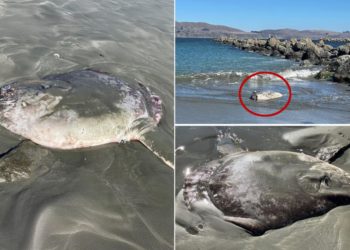The EU is preparing to toughen its stance on issuing visas to Russian nationals following years of pressure from member countries along its eastern border.
A European Commission official told POLITICO that new guidelines for nations in the bloc, due at the end of the year, will recommend stiffer restrictions on issuing visas to Russians and citizens of other hostile countries.
Two European diplomats from countries bordering Russia said their governments have for years lobbied Brussels to issue such guidance, with one diplomat describing them as long overdue. The Commission official and European diplomats were granted anonymity as they were not authorized to publicly discuss the sensitive file.
The EU already scrapped its visa facilitation agreement with Russia in September 2022 after Moscow launched its full-scale invasion of Ukraine, making the application process more expensive and arduous.
But visas remain the responsibility of individual member countries, meaning the Commission executive cannot impose a sweeping ban on Russians entering the bloc.
As a result, national policies vary widely, with some countries, such as Poland, Czechia, Finland, Latvia, Estonia and Lithuania blocking or severely limiting visa applications from Russians except in specific cases; while others, including Hungary, France, Spain and Italy, continue to grant them more liberally.
In 2024, more than half a million Russians received Schengen visas, according to data from the Commission — a marked increase from 2023, though still far below prewar levels, with more than 4 million issued in 2019.
The Commission’s upcoming bloc-wide strategy, set to be released in December, will not impose binding rules but rather set out common recommendations, including stricter criteria for Russians entering the bloc, according to the Commission official.
According to a call for evidence from Brussels, the plan will partly “focus on addressing emerging challenges, particularly those related to security risks.”
The mooted guidelines, which are still under discussion, are separate from any potential visa ban being considered as part of the next package of EU sanctions against Russia.
Latvia halted tourist visas for Russians three years ago. Asked about the EU’s incoming new guidelines, its foreign minister, Baiba Braže, stressed the need to “ensure a unified and consistent approach across the EU” when issuing visas to Russian nationals.
Some members of Russia’s civil society have warned the EU against weaponizing tourist visas against Moscow.
Yulia Navalnaya, a key figure in Russia’s exiled opposition and widow of late opposition leader Alexei Navalny, this week voiced her dismay after media reports the EU was considering a Russian tourist ban as part of its 19th sanctions package, set to be unveiled later this month.
In a letter to the EU’s foreign policy chief Kaja Kallas, Navalnaya urged Brussels to “make a clear distinction between the responsibility of the regime and ordinary Russians.” She suggested aiming such restrictions at “oligarchs, security officials, propagandists, and other accomplices of the regime.”
Czech Foreign Minister Jan Lipavský has long proposed banning Russian diplomats from traveling outside the country where they have been posted.
“It is an unnecessary advantage we give to the Russian regime, and it is being abused to facilitate sabotage operations,” he said last month.
The post Brussels set to recommend stricter visa rules for Russians appeared first on Politico.




